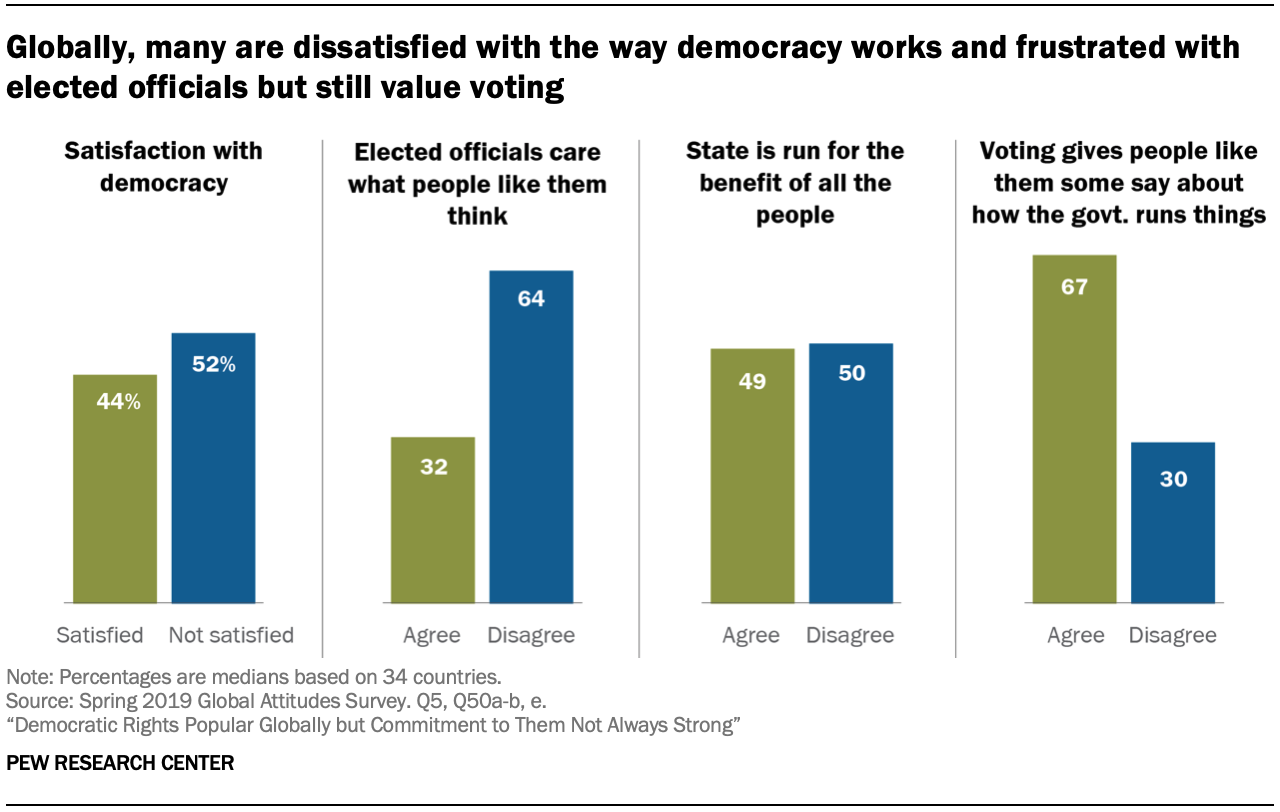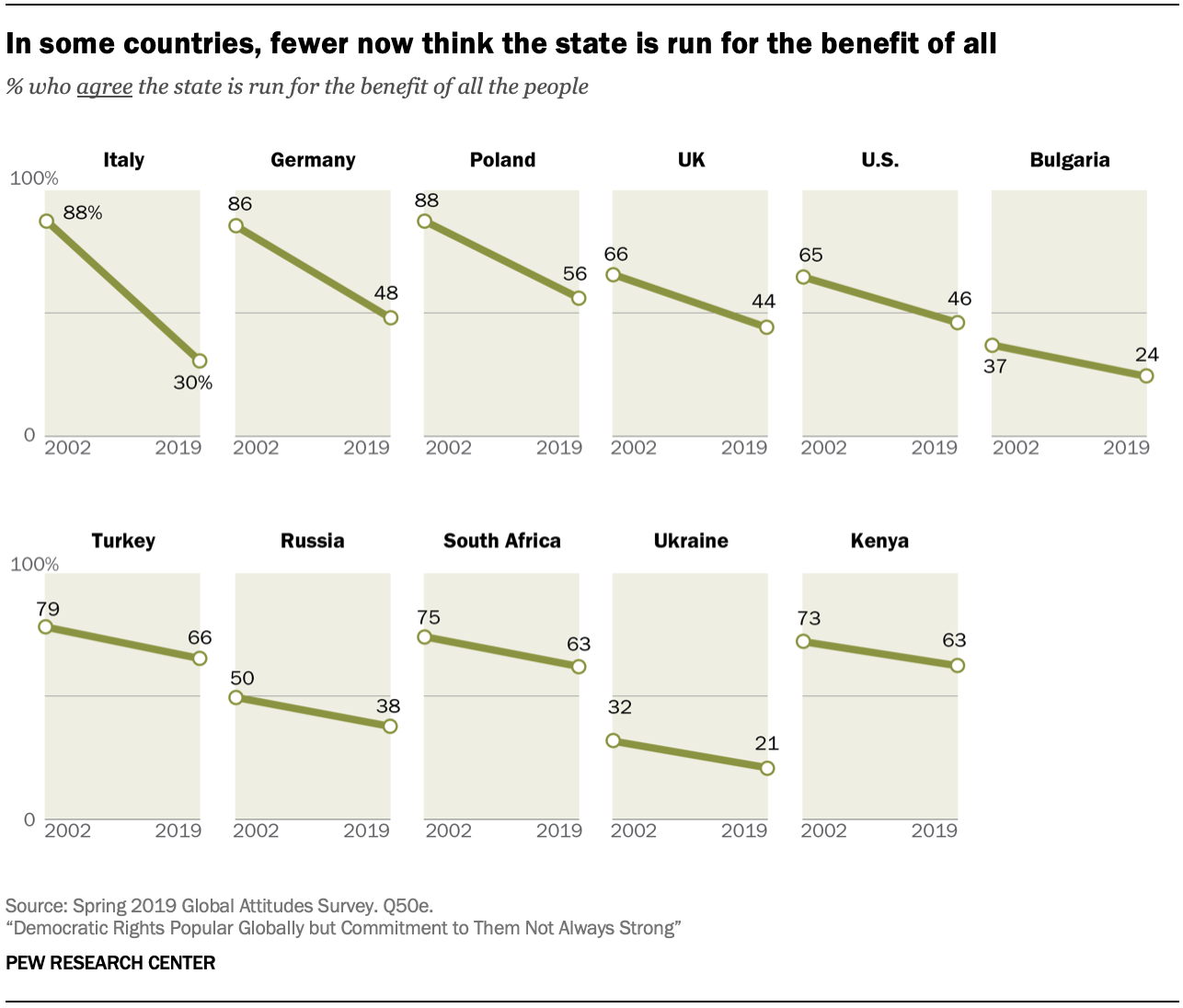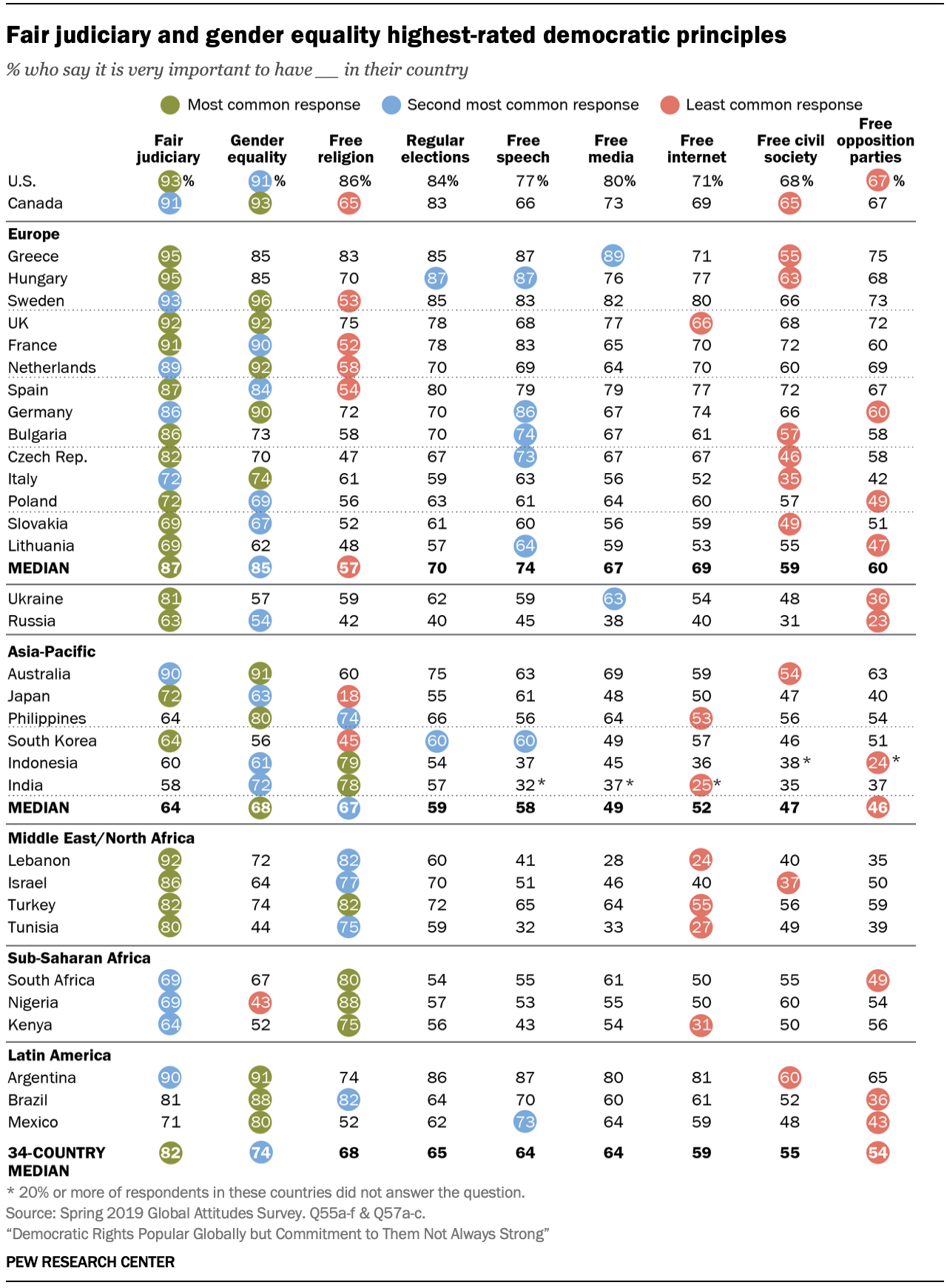This analysis focuses on democratic values and democratic satisfaction in 34 countries. Democracy is one of the core topics we explore in our annual Global Attitudes Survey. This report also includes views about elected officials, voting and whether the state is run for the benefit for all people.
For this report, we used data from a survey conducted across 34 countries from May 13 to Oct. 2, 2019, totaling 38,426 respondents. The surveys were conducted face-to-face across Africa, Latin America and the Middle East, and on the phone in United States and Canada. In the Asia-Pacific region, face-to-face surveys were conducted in India, Indonesia and the Philippines, while phone surveys were administered in Australia, Japan and South Korea. Across Europe, the survey was conducted over the phone in France, Germany, the Netherlands, Spain, Sweden and the UK, but face-to-face in Bulgaria, the Czech Republic, Greece, Hungary, Italy, Lithuania, Poland, Russia, Slovakia and Ukraine.
Here are the questions used for the report, along with responses, and the survey methodology.
Over the past few years, numerous scholars have found evidence that the health of democracy is in decline around the world, using terms such as “democratic backsliding” or “democratic recession” to describe an overall deterioration of democratic rights and institutions.
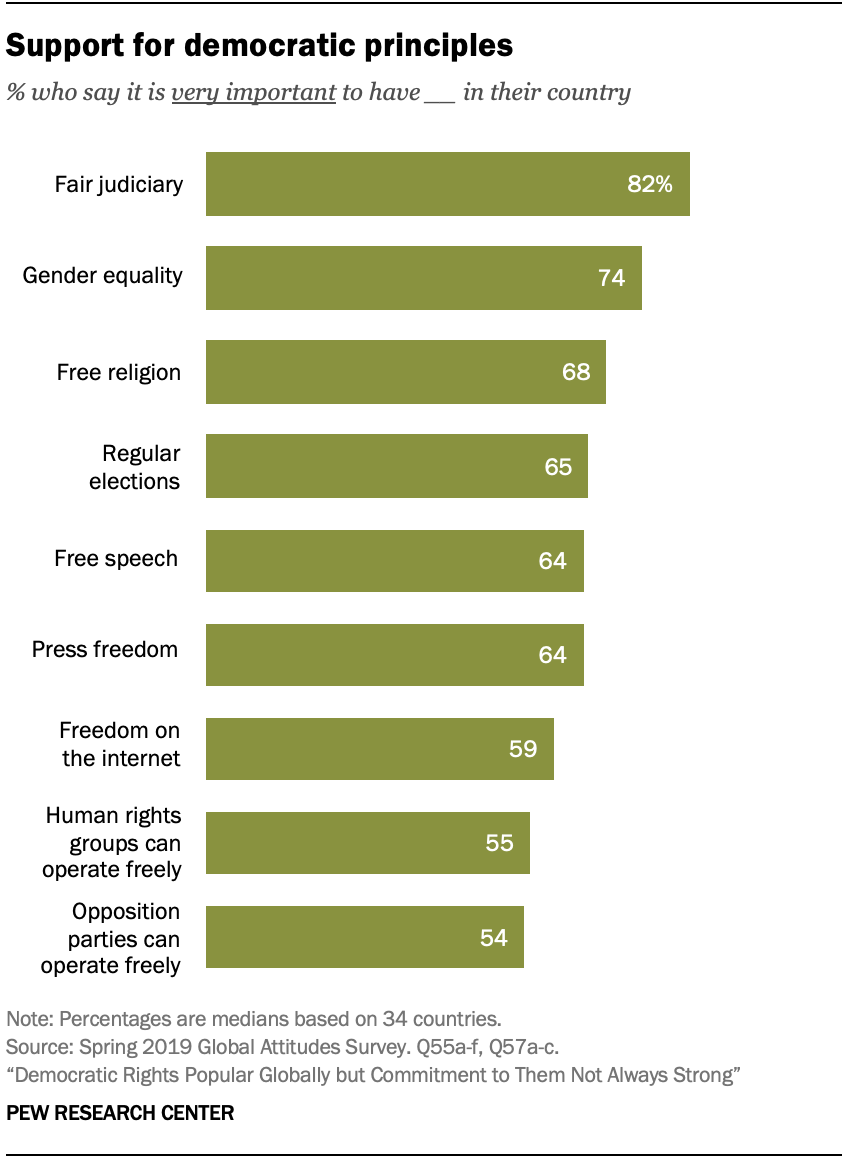 As a new 34-nation Pew Research Center survey highlights, democracy remains a popular idea among average citizens, but commitment to democratic ideals is not always strong. And many are unhappy with how democracy is working.
As a new 34-nation Pew Research Center survey highlights, democracy remains a popular idea among average citizens, but commitment to democratic ideals is not always strong. And many are unhappy with how democracy is working.
As previous Pew Research Center studies have shown, people who are dissatisfied with how democracy is functioning are often less committed to representative democracy, and one important driver of dissatisfaction with democracy is frustration with political elites. In the current survey, a median of 64% across the countries polled believe elected officials do not care what people like them think. And, in nearly every nation surveyed, those who think politicians don’t care about average citizens are more likely to be dissatisfied with the way democracy is functioning in their country.
Overwhelming majorities say the democratic principles tested on the survey are at least somewhat important. However, a stronger measure of commitment to democracy is the share of people who say it is very important to have these things in their country. Often, underwhelming percentages describe democratic rights and institutions as very important.
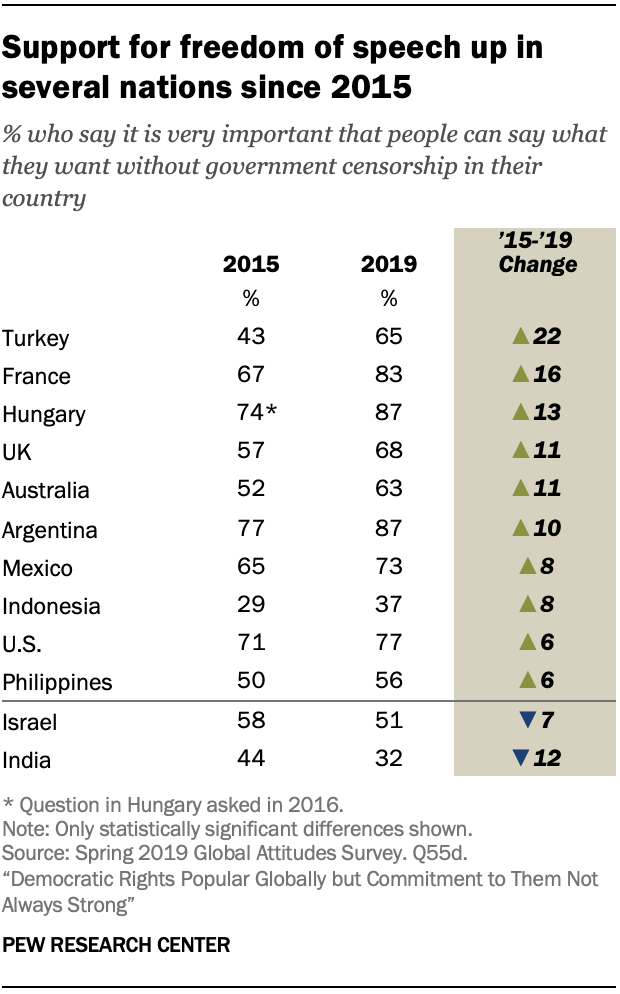 The survey highlights important differences among nations regarding democratic attitudes. Despite recent concerns about the health of democracy in the United States, Europe and Latin America, respondents from these places are often more likely than those from other regions to voice strong support for democratic principles. The largest shares of the public describing all nine rights and institutions tested as very important are in the U.S. and Hungary; still, only a third in these countries (33%) consider all nine very important. In eight nations, the share of the public expressing this view is in the single digits.
The survey highlights important differences among nations regarding democratic attitudes. Despite recent concerns about the health of democracy in the United States, Europe and Latin America, respondents from these places are often more likely than those from other regions to voice strong support for democratic principles. The largest shares of the public describing all nine rights and institutions tested as very important are in the U.S. and Hungary; still, only a third in these countries (33%) consider all nine very important. In eight nations, the share of the public expressing this view is in the single digits.
Around the globe people make distinctions between the various principles tested – while a median of 82% across 34 nations say it is very important to live in a country where the judicial system treats everyone the same, fewer say the same about having a political system that allows human rights organizations or opposition parties to operate freely.
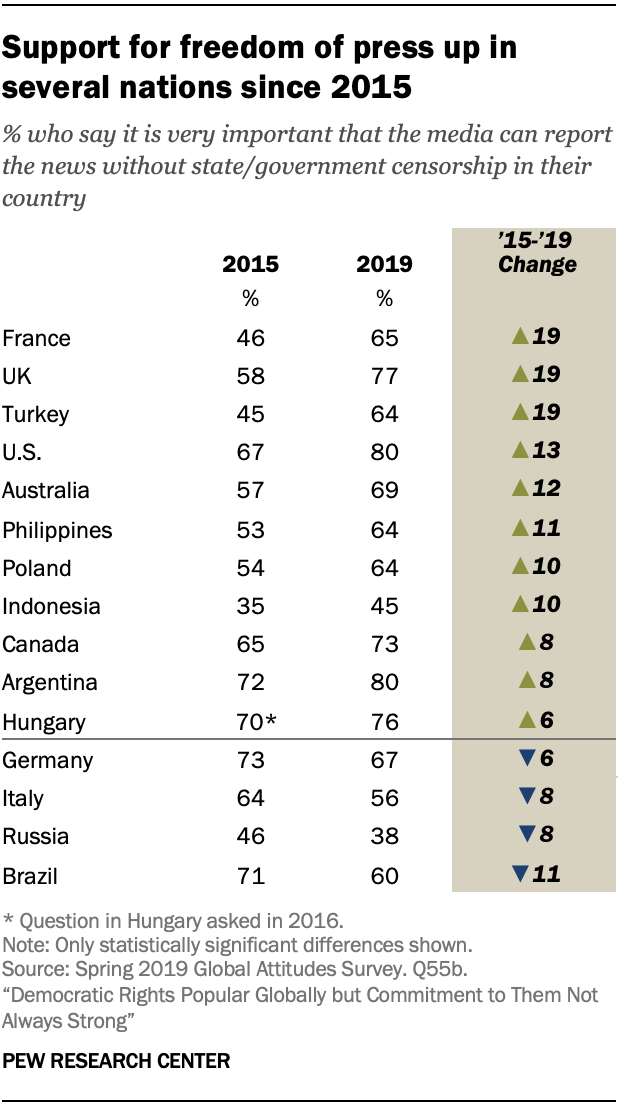 Attitudes toward democratic principles have remained generally stable since the Pew Research Center first asked many of these questions in 2015; however, there have been a few notable changes. For example, support for freedom on the internet, freedom of the press, free speech and gender equality has risen in many countries. Support for press freedom is up significantly in a few nations, where organizations such as Reporters Without Borders and V-Dem have documented declines in media freedom over the past several years, such as in Turkey and the United States.
Attitudes toward democratic principles have remained generally stable since the Pew Research Center first asked many of these questions in 2015; however, there have been a few notable changes. For example, support for freedom on the internet, freedom of the press, free speech and gender equality has risen in many countries. Support for press freedom is up significantly in a few nations, where organizations such as Reporters Without Borders and V-Dem have documented declines in media freedom over the past several years, such as in Turkey and the United States.
In the U.S., the percentage of people who said that freedom of the press is very important rose by 13 percentage points from 2015 to 2019. However, this increase occurred mostly among Democrats and Democratic-leaning independents, rising from 64% to 85%. Among Republicans and Republican-leaning independents, it remained largely unchanged (72% to 77%).
These are among the major findings from a Pew Research Center survey conducted among 38,426 people in 34 countries from May 13 to Oct. 2, 2019.
Many are frustrated with how democracy is functioning
There is considerable dissatisfaction with the way democracy is working in many countries. Across the nations polled, a median of 52% are dissatisfied with how their democracy is working, while 44% are satisfied. Greeks, Bulgarians and Nigerians register the highest levels of dissatisfaction. In general, people with lower incomes and those who do not support the ruling party are more likely to be dissatisfied with the functioning of democracy. Further, in many European countries, supporters of right-wing populist political parties are especially likely to hold this view. Supporters of Poland’s Law and Justice Party and Hungary’s Fidesz Party – two governing populist parties – show the opposite pattern.
One way in which people are unhappy with the way democracy works is that they see political elites as out of touch. Across the nations surveyed, a median of 64% disagree with the statement “Most elected officials care what people like me think.” This opinion is particularly widespread in Europe – a median of 69% express this view. Further, 71% share this view in the U.S. In contrast, fewer say this in the three Asian emerging economies included in the study: India (31%), the Philippines (29%) and Indonesia (18%).
When asked whether the state is run for benefit of all the people, global publics are almost evenly divided: A median of 49% say yes, while 50% say no. But there are large differences across countries. For instance, 88% in Slovakia believe the state is run for the benefit of all, but just 19% hold this view in Greece. Overall, the share of the public saying the state is run to benefit everyone in society has declined in many nations since the Pew Research Center asked the question in 2002. Three nations – Japan, the Czech Republic and Slovakia – have seen an increase in the share who say the state is run for the benefit of all since 2002.
Despite the frustration many people feel about political leaders and the way their political systems are working, they have not given up on democracy, and most still believe they can have a voice in the process. A median of 67% agree that voting gives ordinary people some say about how the government runs things.
Differing attitudes toward democratic rights and institutions
The nine democratic rights and institutions tested on the survey receive widely different levels of support from global publics. The idea of a fair judiciary is the most vital – a median of 82% say it is very important, and, of the nine items tested, it has the highest percentage describing it as very important in 19 countries (it has the second-highest percentage in 10 countries). Gender equality is next – a median of 74% say it is very important, and it is either the first- or second-highest rated principle in most nations, although it is the lowest priority in Nigeria.
Freedom of religion also garners a great deal of support. Across the nations polled, a median of 68% consider it very important, and it is the top priority in all three sub-Saharan African nations in the study as well as in Turkey, Indonesia and India. However, it is the lowest priority in several more secular nations, especially in Europe, where the French, Swedes, Spanish and Dutch all rate it their lowest priority. The same is true in Japan, South Korea and Canada.
Holding regular elections with at least two political parties is considered very important by a median of 65% across the nations polled, and more than half hold this view in every nation surveyed except Russia.
There is general support for the three forms of free expression tested on the survey – free speech, freedom of the press and freedom on the internet – although the strength of that support varies cross-nationally. Freedom of speech is the second-highest priority in seven countries, although the share of the public rating it very important dips below 50% in Tunisia, India, Indonesia, Lebanon, Kenya and Russia. Roughly half or fewer say this about press freedom in eight nations. Internet freedom receives somewhat lower support overall (a median of 59% consider it very important), and in seven countries the share rating it very important is below 50%.
While freedom of expression is mostly endorsed by publics around the world, it is also worth noting that previous Pew Research Center studies have shown that how people define free expression can vary substantially across nations. A 38-nation 2015 survey found that, even among those who value free expression, there are widely different views about the types of speech governments should allow.
Having a system where civil society organizations such as human rights groups can operate freely (a median of 55% say it is very important) and having freely operating opposition parties (54%) are the two lowest-rated principles.


